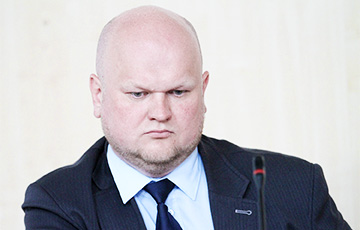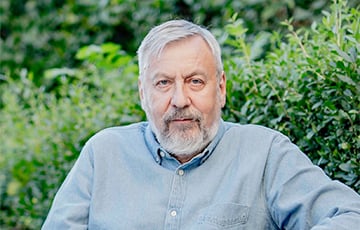Aleksandras Matonis: Military Belarus Should Be Taken Seriously
- 10.02.2016, 14:48
- 4,078

Photo: DELFI
For Lithuania, not only the militarized Kaliningrad region of Russia but also Belarus are dangerous.
While Russia is pursuing a policy of strengthening its military component in the westerly direction and at the borders of the Baltic States, NATO is ready to ensure a reasonable increase is the presence of allies, said in an interview to charter97.org Lithuanian military expert Aleksandras Matonis.
According to him, danger for Lithuania may come not only from the militarized Kaliningrad region, but also from Belarus, which should be regarded very seriously.
"At this time, in the military sense Belarus as a sovereign state with its own agenda probably does not exist," he said.
- What would you call the main components of the Lithuanian security for the time being?
- This is a very broad question, that can take a lot of time to answer. In brief, the main challenge now, undoubtedly, is that the Eastern neighborhood is an unpredictable structure. Under the Eastern Neighbourhood, I also mean the south-west neighborhood, ie the border with the Kaliningrad region, which is hypermilitarized, if such a term can be used at all. The accumulation of military equipment, military personnel, has probably reached the level of the Cold War. And the fact that the Western Military District of Russia constantly holds military exercises to test the readiness, relocation of large groups of troops, leads to the increasing fighting capacity of the Russian army in this area. The question is, what is the purpose of it, what are the tasks set? This is the main and fundamental question.
- It turns out that, after all, that the military aspect of security the crucial one?
- Yes, because I think that other issues, such as energy security are still remaining important, but some decisions have already led to significant results. The presence of a liquefied natural gas terminal placed the Lithuanian government in a completely different negotiating position with Gazprom and other potential suppliers of natural gas. Of course, here a big role is played by the cabling and electrical connections -- we are now in a different situation than before.
Under military threat, I mean the fact that we are in the active phase of the information war. Rather, it is the war that we do not conduct, but are on the defensive all the same.
- How does Lithuania manage to resist the information policy of Russia?
- I think we are now in a position of the commander, who is standing on the battlefield and seeing the location of enemy troops. We can more or less see the directions in which the enemy is planning to attack, but we did not see what reserve he has accumulated somewhere over the hill and the forest, a diversionary tactic he is able to apply. In other words, we are able to identify the main lines of information attack and to inform the population, thereby reducing the effectiveness of such attacks. But, alas, we cannot predict the future direction, because the Kremlin (not Russian, I want to identify it in the first place with the people in the Kremlin) has huge resources, both analytical and planning resources. They are absolutely unique in its power, there are many options, scenarios are constantly changing. It is clear that information experts are also analyzing the resistance, taking new steps, correct in some cases their tactics and strategy.
- You mentioned the Kaliningrad region, but near Lithuania there is Belarus, which is in a Union State with Russia, they have a unified air defense system, Russia intends to establish its base in Belarus. What does Lithuania think about Belarus in the context of security? Does Lithuania feel threatened from that side?
- In terms of the military assessment, Belarus is the state you need to consider seriously, despite the recently made public assumptions that Lukashenka is planning his own security game. I would not give in to such incorrect evaluation. Belarus is in Union with Russia, it has repeatedly provided its territory for the location of Russian troops during military maneuvers with aggressive moves for the purpose deblocking Suvalkai isthmus in order to join with the Kaliningrad region. These war games were played repeatedly, and certainly when you play these scenarios, the armed forces of Belarus played a certain role. It may be a supportive role, but a very serious one in the military planning of the Russian troops.
- It is not yet decided, whether there will be a Russian base in Belarus, but what may be the reaction of Lithuania?
- I have no evidence that such a base will appear, but we have heard about the intentions made publicly. Of course, this should be considered very seriously, as a new stage of military cooperation between Belarus and Russia, as well as a certain vector in the foreign policy of Belarus and defense policy. At the moment, militarily, Belarus with its independent agenda probably does not exist. Yet in terms of military assistance, cooperation of these countries should be considered in total.
- Probably, it is also true in terms of energy security. We know that Belarus is building a nuclear power plant in Astravets using the Russian money...
- I'm not an expert on economic issues, but, judging by the fact that the public can see - Astravets NPP is financially a Russian project.
- How did i the NATO actions to strengthen the contingent and supply the equipment affect the security of those countries? Did it lead to any results?
- It did lead to some symbolic results. I consider to be very serious the fact that the territory of the six eastern NATO members now has small staff headquarters, which are designed to ensure that in the event of changes in the military situation, they will provide assistance between national forces, allied forces and the NATO headquarters. Also, the staffs are very helpful in the planning of exercises. The fact that the exercises are held here actively is also very useful, because the armed forces of the Baltic countries do not have much experience in dealing with allies in conventional war with all sorts of weapons. This will undoubtedly increase the combat capability and the ability to communicate on the part of Lithuania, Latvia and Estonia.
Secondly, some infrastructure is still created. Even though the number of deployed military equipment here is symbolic -- now there are about half a battalion of American armored Strikers deployed as rotational forces on the territory of Lithuania, the warehouses have several tens of vehicles. It's a small amount, not exceeding the number of half a battalion, but the fact that it is deployed here, shows that the extra deployment possibilities have been thought through, if necessary.
Plus, the presence of rotational forces is also important here. I have already spoken about the exercises, which are useful not only to us but also to allies. They are getting used to act in an area where they have never settled down in the conditions of our marshes, forests, our urban environments. The exercises were carried out repeatedly.
- How will the situation develop in the near future? Will the security component strengthen in Lithuania? Should you prepare for possible military intervention?
- I usually answer to this with a simple phrase "I do not know." I do not know what is in the head of the current Russian leadership, so any discussions of what will be in the future are speculative. Based on the human logic, it should not escalate, because it is contrary to the interests of all. But as there is no human logic in many decisions of the Kremlin leadership, I can think of nothing.
I can only assume that until thre are reverse actions -- not to strengthen but weaken Russia's military presence on the territory of the Kaliningrad region, the Western Military District, until there are such signs, NATO countries should be prepared to ensure a reasonable increase of allied presence by creating some military supplies, military equipment location, more active participation in the exercises in the Baltic States, Poland, and perhaps south-eastern flank of NATO, because it is all happening tenfold in Russia. Recent discussions on the establishment of new infantry divisions, the new tank army to stay in Nizhny Novgorod and Pskov regions - all in this area is similar to the situation during the Cold War. And it is very unfortunate.










